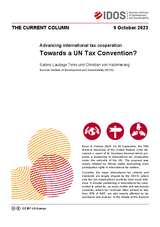Advancing international tax cooperation
Towards a UN Tax Convention?
Laudage Teles, Sabine / Christian von HaldenwangThe Current Column (2023)
Bonn: German Institute of Development and Sustainability (IDOS), The Current Column of 9 October 2023
Bonn, 9 October 2023. On 20 September, the 78th General Assembly of the United Nations (UN) discussed a report of its Secretary-General which proposes a deepening of international tax cooperation under the umbrella of the UN. The proposal was mainly initiated by African states demanding more participation rights in international tax matters.
Currently, the major international tax reforms and standards are largely shaped by the OECD, where only the rich industrialised countries have much influence. A broader positioning in international tax cooperation is called for, as many middle and low-income countries, whose tax revenues often amount to less than 15% of GDP, are also heavily affected by tax avoidance and evasion. In the debate at the General Assembly, the idea of a framework convention on international tax cooperation received a great deal of support, although important OECD member countries, including Germany, the USA and the UK, were noticeably silent. In November 2023, the General Assembly is to vote on whether to initiate multilateral negotiations on such a tax convention.
A UN tax convention would make decision-making processes on international tax regimes and reforms more inclusive and effective. The UN, unlike the OECD or other club-governance formats such as the G7 and G20, is representative in its membership and has inclusive decision-making processes that reflect the interests of all states equally. Moreover, all UN member states can participate unconditionally, from agenda setting to implementation. Therefore, decisions on reforming international taxation principles should best be taken within the UN.
International tax cooperation has been led for decades by the OECD, which is considered the global standard setter for international tax rules. For example, the majority of the more than 3,000 bilateral tax treaties between states are based on a template developed by the OECD primarily for its own member states. However, it is not only OECD members that suffer from loopholes in the international tax system, but also many other countries. In particular, the taxation of multinational corporations and wealthy individuals poses major challenges for many states. The result is billions of dollars of global tax revenue lost every year.
Since 2015, as part of the Base Erosion and Profit Shifting (BEPS) Project, important reforms have been promoted to combat international tax avoidance. The BEPS project was mandated by the G20 and largely implemented by the OECD. Non-member states of the OECD were only included in the process in a second step by being able to join the ‘Inclusive Framework on BEPS’. Eight years after the start of the BEPS project, however, hardly any successes are visible in the fight against global tax avoidance, even if the project has certainly brought about positive changes in terms of transparency and capacity building.
On the initiative of several African countries, a UN resolution was adopted last year which paved the way for discussions on a multilateral tax convention. The aforementioned report of the UN Secretary-General now makes three concrete proposals on how international tax cooperation could be shaped: Option 1 is a binding multilateral convention that contains concrete obligations and can intervene in states’ taxation rights within its mandate. Option 2 is a binding framework convention that primarily sets out the governance framework for international tax reforms and in this respect is primarily constitutive. Option 3 is a non-binding framework that formulates guidelines and principles for reforming the international tax system. Several representatives from Africa, Asia and Latin America spoke in favour of option 2 at the General Assembly in September.
Under Option 2, key decision-making processes in international tax cooperation would be shifted from the OECD to the UN in the long term to make participation more inclusive. Nevertheless, the OECD’s expertise on international tax issues, which has been accumulated over decades, should continue to be used. For example, major strategic decisions on international tax reforms could be taken by the UN, while the OECD would remain responsible for working out the technical implementation (just as the G20 has tasked the OECD with the BEPS project). The expertise of the IMF and the World Bank, which advise low- and middle-income countries on national tax reforms, should also be incorporated. A coordinating forum already exists – the Platform for Collaboration on Tax (PCT) – which keeps an eye on the division of tasks between the four international organisations.
A UN framework convention on international tax cooperation could be a step forward in the worldwide fight against tax avoidance and evasion. Progress in this area would also contribute to the financing of the 17 Sustainable Development Goals. Despite its great efforts, the OECD has not been able to effectively stop such practices. It makes sense to discuss alternative solutions now. Germany and the EU should therefore support the UN Secretary-General’s proposal for such a tax convention when it comes to a vote in November.



